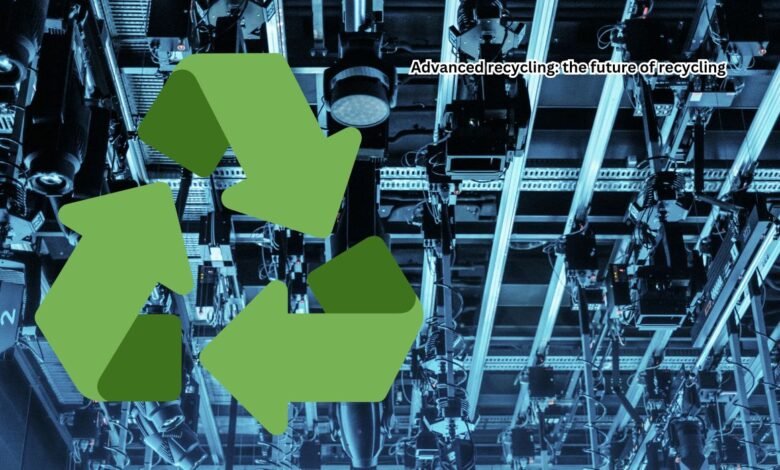Advanced recycling: the future of recycling
Discover how advanced recycling technologies are shaping the future of waste management and sustainability.

Advanced recycling represents a significant leap forward in the realm of waste management, offering a sophisticated approach that transcends the limitations of traditional recycling methods. Unlike conventional recycling, which typically involves mechanically processing materials to produce new products, advanced recycling employs innovative technologies to break down plastics into their fundamental components. This transformative process enables the creation of new materials with properties akin to virgin plastics.
Key technologies integral to advanced recycling include:
- Chemical Recycling: This method utilizes chemical reactions to decompose plastics into their original monomers. These monomers can then be re-polymerized to form new plastics, ensuring high-quality outputs.
- Pyrolysis: Pyrolysis involves heating plastics in the absence of oxygen, converting them into liquid and gaseous hydrocarbons. These hydrocarbons can be refined and used as feedstock for producing new plastics or fuels.
- Gasification: In this process, plastics are subjected to high temperatures in a controlled environment, breaking them down into syngas—a mixture of hydrogen and carbon monoxide. Syngas can be further processed to generate new plastic materials or energy.
These advanced recycling techniques offer several advantages over traditional methods. For one, they are capable of recycling a broader array of plastic types, including those that are typically challenging to recycle mechanically, such as multi-layered packaging and mixed plastics. Additionally, by converting plastics back into their basic building blocks, these processes ensure that the recycled materials retain high quality, comparable to new plastics.
Overall, advanced recycling holds the promise of significantly enhancing our ability to manage plastic waste, contributing to a more sustainable and circular economy. As these technologies continue to evolve, they have the potential to revolutionize the recycling industry and reduce the environmental impact of plastic waste.
Advanced recycling, an innovative approach in waste management, offers a myriad of advantages over traditional recycling methods. One of the significant environmental benefits is the substantial reduction in landfill waste. By utilizing advanced technologies, waste that would typically end up in landfills can be processed and repurposed, thereby extending the lifecycle of materials and alleviating the pressure on landfill sites. This not only conserves space but also mitigates the adverse effects associated with landfill operations, such as soil contamination and methane emissions.
Moreover, advanced recycling plays a pivotal role in lowering carbon emissions. Traditional recycling processes often involve energy-intensive procedures that contribute to greenhouse gas emissions. In contrast, advanced recycling techniques, such as chemical recycling, break down plastics and other materials into their basic components at a molecular level, allowing for a more efficient and eco-friendly conversion process. This reduction in energy consumption directly correlates to fewer carbon emissions, fostering a cleaner and more sustainable environment.
Another crucial advantage is the contribution of advanced recycling to the circular economy. By transforming waste into valuable resources, it supports the creation of a sustainable loop where materials are continually reused, reducing the reliance on virgin raw materials. This not only preserves natural resources but also reduces the environmental impact associated with their extraction and processing. Additionally, the economic benefits are substantial. The growth of the advanced recycling industry can spur job creation, providing new opportunities in various sectors, from research and development to operations and management. Furthermore, businesses can benefit from reduced costs for raw materials, as recycled materials often prove to be a more cost-effective alternative.
Comparison of Recycling Methods
| Criteria | Traditional Recycling | Advanced Recycling |
|---|---|---|
| Efficiency | Moderate | High |
| Environmental Impact | High carbon emissions, limited material recovery | Low carbon emissions, extensive material recovery |
| Economic Impact | Lower job creation, higher raw material costs | Higher job creation, lower raw material costs |
| Contribution to Circular Economy | Limited | Significant |
Advanced recycling Challenges and Limitations
Advanced recycling technologies represent a significant leap forward in waste management, promising to transform the recycling landscape. However, these promising innovations come with their own set of challenges and limitations. One of the foremost issues is the high initial investment costs. Establishing advanced recycling facilities requires substantial capital due to the sophisticated machinery and technology involved. This financial barrier can deter potential investors and limit widespread adoption.
Technological complexity is another critical challenge. Advanced recycling processes often involve intricate procedures such as chemical recycling and molecular recovery, which necessitate advanced technical expertise and continuous monitoring. This complexity can lead to operational inefficiencies and increased costs, making it difficult for smaller enterprises to compete.
Furthermore, the need for specialized infrastructure is a significant limitation. Unlike traditional recycling, which can often utilize existing waste management facilities, advanced recycling requires bespoke installations tailored to specific processes. This requirement not only escalates costs but also poses logistical challenges, especially in regions lacking the necessary infrastructure.
Regulatory hurdles further compound these challenges. The regulatory landscape for advanced recycling is still evolving, and the lack of standardized regulations can create uncertainty for businesses and investors. For instance, policies regarding waste categorization, processing standards, and environmental impact assessments vary widely across different jurisdictions, complicating the implementation and scaling of advanced recycling technologies.
Real-world examples illustrate these obstacles. In the United States, several advanced recycling projects have encountered delays and increased costs due to permitting issues and regulatory compliance requirements. Similarly, in Europe, the absence of uniform regulations has hindered the cross-border movement of recyclable materials, limiting the efficiency of recycling networks.
Despite these challenges, ongoing research and development efforts aim to address these limitations. Innovations in process simplification, cost reduction, and modular infrastructure are being explored to make advanced recycling more accessible. Additionally, efforts to harmonize regulations at national and international levels are underway, which could provide the necessary framework for the growth of advanced recycling technologies.
The Future of Recycling: Trends and Innovations
The landscape of waste management is undergoing a significant transformation, driven by advanced recycling technologies. The future of recycling is poised to be shaped by several emerging trends and innovations, promising a more sustainable and efficient approach to handling waste materials. One of the most promising advancements is the integration of AI-driven sorting technologies. These systems leverage machine learning algorithms and sophisticated sensors to accurately identify and sort recyclable materials, significantly reducing contamination rates and improving the overall efficiency of recycling processes.
In addition to AI, the development of more efficient chemical recycling processes is gaining momentum. Unlike traditional mechanical recycling, which often degrades the quality of materials, chemical recycling breaks down plastics and other materials at the molecular level, allowing for the creation of new products with virgin-like quality. This innovation holds the potential to drastically reduce the amount of waste that ends up in landfills, as well as the reliance on fossil fuels for new plastic production.
Several companies and municipalities are already making strides in implementing advanced recycling methods. For instance, major corporations like Eastman Chemical Company and Loop Industries have pioneered chemical recycling technologies that are now being adopted globally. Municipal initiatives, such as San Francisco’s Zero Waste program, have also demonstrated the feasibility and benefits of integrating advanced recycling techniques at the city level. These case studies serve as compelling examples of how innovation can drive substantial improvements in waste management.
- Crossware Email Signature Wraps Up Successful Showcase at GITEX Africa 2024
- ‘Still a strong story.’ Why India’s election shock won’t derail its economic boom
- Modi set to win narrow majority, but his party’s numbers slide
Potential legislative changes and global efforts further bolster the future of advanced recycling. Governments worldwide are beginning to recognize the importance of sustainable waste management practices, paving the way for policies that support the adoption of advanced recycling technologies. For example, the European Union’s Circular Economy Action Plan emphasizes the need for innovative recycling solutions to achieve its sustainability goals.
With continued advancements and growing support from both the private sector and governments, the future of recycling appears promising. The integration of AI-driven sorting, efficient chemical processes, and supportive legislation can collectively lead to a significant reduction in waste, contributing to a more sustainable and environmentally friendly future.



